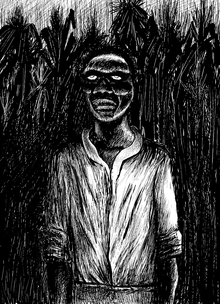Zombie
This article does not have any sources. (September 2009) |
A zombie is a mythical undead creature who has returned to life as a walking corpse. Mythical things that have been "re-animated" are called undead, or the living dead. The zombie myth came from the Caribbean.


Voodoo zombies
changeIn Haiti people believe that Voodoo sorcerers or 'bokor' can bring dead people back to life, making a zombie. The zombie is under the control of the sorcerer because zombies have no free will. It's believed a zombie is a trapped human soul. If a sorcerer can catch the trapped soul, the sorcerer becomes more powerful.
Studies on Haitian zombies
changeWade Davis wrote about zombies in two books, The Serpent and the Rainbow (1985) and Passage of Darkness: The Ethnobiology of the Haitian Zombie (1988). Davis went to Haiti in 1982 and wrote about how a living person can be turned into a zombie by two special powders being rubbed into a wound. The first powder brings a 'deathlike' state because of a certain poison in it, called tetrodotoxin (the same deadly poison found in the Japanese blowfish). At just the right amount, it can make a person almost die, but not quite. The second powder puts the person in a zombie-like state where they seem to have no free will of their own.
Many people outside Haiti do not believe what Davis wrote about, but in Haiti, lots of people believe in the "zombie drugs".
Zombies in history
changeAncient civilizations
changeIn Mesopotamian mythology, Ishtar, the goddess of love and fertility once said in anger:
- "Father give me the Bull of Heaven,
- So he can kill Gilgamesh in his delling.
- If you do not give me the Bull of Heaven,
- I will knock down the Gates of the Netherworld,
- I will smash the doorposts, and leave the doors flat down,
- and will let the dead go up to eat the living!
- And the dead will outnumber the living!"
Middle Ages
changeIn the Middle Ages, many people believed that the souls of the dead could come back as ghosts and haunt the living, often because of a crime that the living person had committed. Sometimes, the ghost could actually take on a physical shape and touch or attack things or people.
Zombies in fiction
changeZombies can walk, think (in some cases), and attack living persons. Most zombies eat the brains of living humans. In zombies, the heart, lungs, and a small part of their brain still work. They may react to their environment, but they do not have consciousness. Zombies can use their skeleton and muscles to move. The skin is rotten. Its hair and nails are falling off. Zombies are usually covered in blood. They often have open wounds and are dressed in ripped clothes.
Zombies appear a lot in horror and fantasy films. Normally, the zombie is a mindless, clumsy corpse which eats human flesh. Zombies can not be called cannibals because they do not eat each other, only living humans. The first zombie stories appeared in the 1600s. Since that time, zombies have appeared in lots of books and films. They have become more popular in modern media, such as Capcom's Resident Evil series and AMC's The Walking Dead.
Characteristics
changeIn zombie movies, zombies are almost always:
- Mobile (able to move) but technically dead, without a heartbeat or other vital signs
- In a decaying (rotting) state, with discolored skin and eyes
- Non-communicative (groaning and howling instead of speaking)
- Unemotional, with no mercy toward victims
- Hungry for human flesh (zombies usually ignore animals)
- Clumsy and violent
- Vulnerable to destruction of the brain (which kills them).
- Unaffected by injuries, even normally fatal ones, as long as the brain isn't damaged badly.
- Contagious: a person that is bitten by a zombie will become a zombie
- Extremely persistent
Related pages
change- List of zombie movies
- Ghost
- Ghoul stories